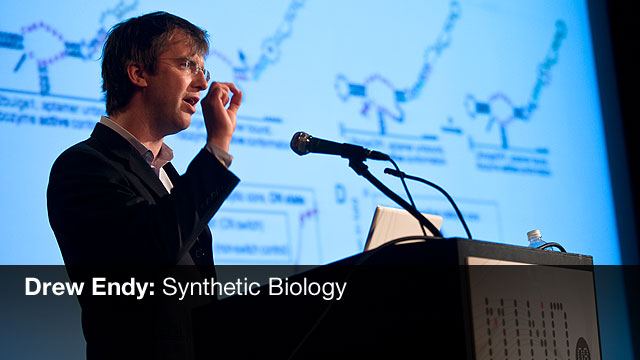Drew Endy is being chosen as a White House Champion of Change for the vision he has demonstrated and for his commitment to open science!
In ways we often barely understand, natural organisms, from piping plovers on Long Island to banana slugs among California’s redwoods, reproduce, struggle, or thrive across amazingly diverse environments. Yet despite this sparse understanding, we already partner with biology to make many necessities. Foods, medicines, fuels, and materials are increasingly manufactured by domesticated or re-engineered organisms: Insulin for treating diabetes is made with re-engineered microbes, and organic mushrooms grown by natural wood fungi that eat sawdust. Forty years after its inception, genetic engineering now underlies about two percent of our domestic economy.
Yet, most of what we might make with biology has not been imagined or created. For example, researchers just figured out how to store archival digital copies of books, including Shakespeare, in chemically synthesized DNA, a molecule so tiny that many millions of books could be stored in mere thimbles. Meanwhile, much of nature’s biodiversity is being lost or increasingly threatened by growing populations and expanding consumption. These natural ecosystems are essential for the wellbeing of our environment and are also the source of almost all biotechnology innovations. We don’t so much engineer biology from scratch as repurpose and refine nature’s existing materials.
Thus, a fundamental challenge confronting everyone, directly or indirectly is to learn to work in better partnership with nature and each other, to make the things we need without destroying ourselves or the environment. “Open science” in every respect, including sharing of ideas, unfettered access to all research literature and data, and freedom-to-use basic biological materials, is central to making this progress.
In this spirit, we started the BioBricks Foundation (BBF) in 2003 as a public-benefit charity with a long-term mission of helping to advance biotechnology to benefit all people and the planet. Tom Knight, then at MIT, had already led the way by teaching how free-to-use technical standards could enable radical, global collaboration. Students in Australia could suddenly take a fragment of natural DNA encoding a microscopic protein-based “balloon” that causes cells to float or sink, and refine it into a standard “biobrick” part. Researchers everywhere could then readily take that BioBrick balloon, and stack it with many other similarly standardized genetic parts to more easily solve innumerable problems.
Since 2003, the BBF has focused on improving open and free-to-use standards that support biological engineering. We have leveraged seed funding from the National Science Foundation to create cooperative partnerships between universities and companies to develop high-quality, standard biological parts. We created a legal tool, the BioBrick Public Agreement (BPA), which allows researchers in academia and industry to easily share free-to-use our standard biological parts. We are now using the BPA to give away many of the best standardized creations from our labs, including genetic switches and amplifying logic gates, so that others can more quickly solve pressing problems.
As Bill Joy, Co-Founder of Sun Microsystems reportedly observed, “No matter who you are, most of the smartest people work for someone else.” “Joy’s Law” applies to bioengineering in almost every way possible. No matter where you are, most of the smartest biologists work for somebody else. Thus, most of the biological discoveries you need for a given problem will be housed somewhere else. Needs and opportunities will exist somewhere else, and the world’s biomanufacturing capacity, distributed across the world’s bread, yogurt, cheese, and brewing facilities, is controlled by someone else. Most of the people who need to use and trust your work won’t ever meet you. In all, tools for sharing will form the foundation of our future bioeconomy.





